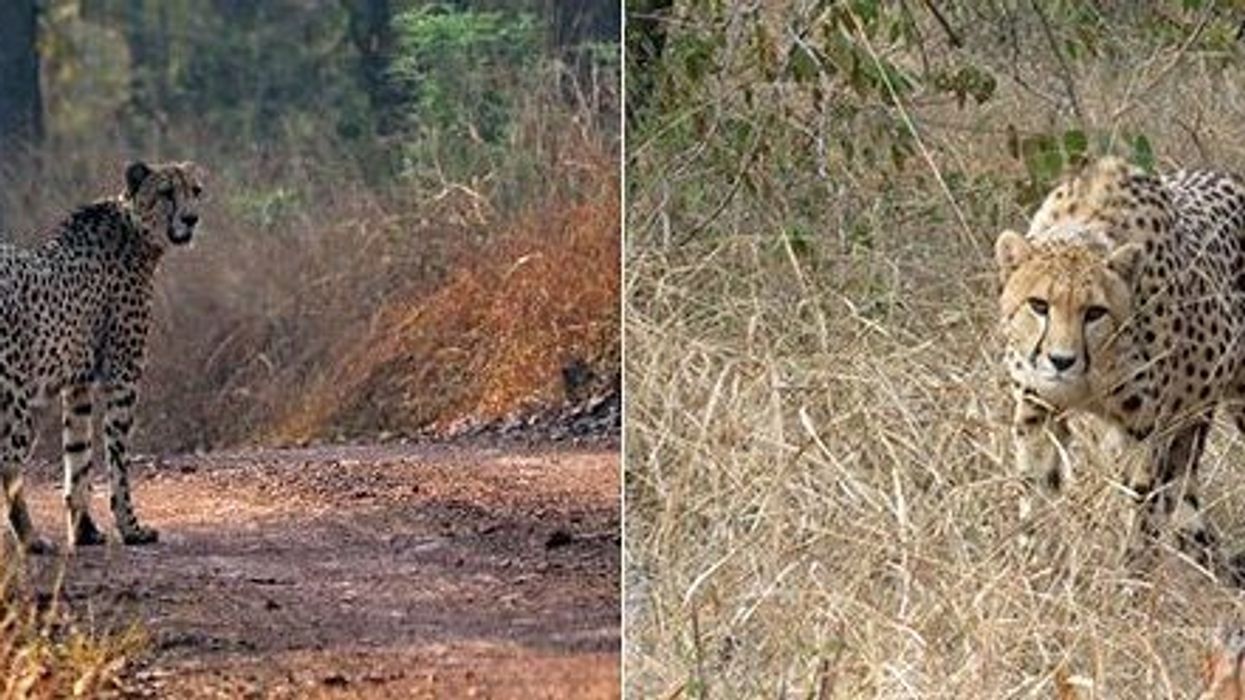Renowned wildlife expert and nature conservationist Divyabhanusinh, a member of the Indian government's Cheetah Task Force, suggests that once the cheetahs brought from Namibia and South Africa stabilise and breed in Kuno National Park in the state of Madhya Pradesh, there is a possibility of introducing lions into the area.
This information is shared in the updated version of his seminal book, "The End of a Trail: The Cheetah in India," which was originally published in 1995.
With a cheetah reintroduction programme underway in India, the newly released book "The Story of India's Cheetahs" aims to generate interest in the animal and promote its protection.
Meanwhile, the prospect of introducing Asiatic lions into Kuno National Park (KNP) in Madhya Pradesh has long been a topic of contentious debate.
Currently, the Asiatic lion population is confined to Gir National Park in Gujarat, India.
In the 1990s, the Indian government proposed translocating some lions from Gir to KNP as a precaution against natural disasters or epidemics that could wipe out the entire population in Gir.
However, the Gujarat government opposed the translocation, citing concerns about the potential spread of diseases and cultural significance of lions to the people of Gujarat.
Earlier, Kuno-Palpur was identified as a potential new habitat for lions to be relocated from their last refuge in Saurashtra.
If the cheetah population stabilises and breeds successfully in Kuno-Palpur, it may also be possible to introduce lions into the area, the expert said.
Divyabhanusinh also expresses that the establishment of viable populations of both species would be a remarkable accomplishment to aspire towards. However, he notes that the Gujarat government's opposition to the move, which dates to 1995, is the main reason why lions from Gujarat have not been relocated to Kuno-Palpur, and it is unrelated to the cheetahs' entry.
As part of the Cheetah reintroduction programme, Prime Minister, Narendra Modi, released the first batch of eight cheetahs - five females and three males - from Namibia into a quarantine enclosure at Kuno on his 72nd birthday in September last year.
Unfortunately, one of the Namibian cheetahs named Sasha, passed away in March due to a kidney-related illness. However, there was good news as another cheetah, Siyaya, gave birth to four cubs on March 29.
Recently, a second translocation of 12 cheetahs from South Africa was flown in and released into Kuno on February 18.
In his book, Divyabhanusinh argues that the controversy over African versus Indian cheetahs is "infructuous".
He explains that the cheetah is one of the most extensively studied large cats, with detailed information about their behaviour, lifespan, and other characteristics documented in Indian and British records, as well as in their natural habitat in Africa. These records show little or no difference between the two species.
According to Divyabhanusingh, the cheetahs that were brought into India from Africa in the early 20th century did not cause any problems. They behaved similarly to Indian cheetahs in captivity and were able to hunt wild Indian antelope with the same ease as their African counterparts.
Divyabhanusingh also notes that the cheetah had been present throughout India for thousands of years, and the reintroduction project did not involve bringing a species that was entirely new to the country.
"The question of sub-species is in a flux. But to call the cheetah exotic is an absurd proposition," he writes in his book.
The book states according to records that the last confirmed sighting of cheetahs in India was near Danto village in Jharkhand's Hazaribag in 1975.
The last cheetah in the Indian subcontinent was reportedly seen in 1997 in Pakistan's Balochistan.
It is commonly believed that the last cheetahs in India were hunted and killed by Maharaja Ramanuj Pratap Singh Deo of the former state of Korea in Koriya district of present-day Chhattisgarh in December 1947. The book notes that the species was declared extinct in India in 1952.
(PTI)




